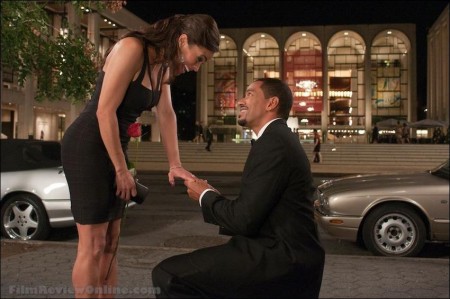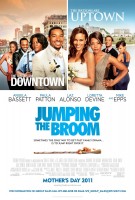Taglines: Sometimes the only way to get past family drama… is to jump right over it.
After a humiliating one night stand, fast-rising corporate lawyer Sabrina Watson (Paula Patton) vows to “save her cookies” until she gets married, and asks God to help her find Mr. Right. Then a chance meeting with promising young Wall Streeter Jason Taylor (Laz Alonso) becomes a whirlwind romance and Sabrina is sure she’s found her soul mate. When she’s offered a career-making transfer to China, Jason proposes to Sabrina despite having known each other for just six months.
But when Sabrina’s well-educated, Old Money parents, Claudine (Angela Bassett) and Greg (Brian Stokes Mitchell), meet Jason’s down-to-earth postal worker mom Pam (Loretta Devine) for the first time at the Watson estate on Martha’s Vineyard, the gaping class divide raises hackles on both sides. And when Pam produces the broom that she and her late husband jumped over at their own wedding, Sabrina’s offhand dismissal of the age-old tradition reinforces her future mother-in-law’s belief that the Watsons think they are too good for the Taylors.
About the Production
Long-time friends and colleagues Elizabeth Hunter and Glendon Palmer conceived the initial idea for Jumping the Broom at an awards show for African-Americans in the entertainment industry. Looking around the room at their glamorous and accomplished peers, Hunter and Palmer were inspired to create a film with an unusual point of view.
“Glendon and I started talking about making a movie about African-Americans that we haven’t necessarily seen on screen before,” says Hunter. “There’s diversity in the African-American community that isn’t often depicted in films. We both feel it is important to see that we’re not a monolithic group. There are rich African-Americans, there are poor African-Americans and there is everything in between.”
“We were also interested in the idea of an ensemble film,” adds Palmer. “I pitched Elizabeth a concept about an upper-class black family and a working-class black family meeting for the first time at a weekend wedding in Martha’s Vineyard. And that’s all I said to her.”
The idea struck a chord with Hunter. Based on that conversation, she created a detailed treatment for a film about a young couple whose families don’t meet until the weekend of their wedding. The Watsons, the bride’s family, are Old Money aristocrats; the Taylors, the groom’s, are working class Brooklynites. “Each family, despite how they want to present themselves, has issues to deal with,” says Palmer. “One mother cannot let go of her son. The other couple has this amazing house, but there are difficulties hidden beneath that façade. Over the weekend, truths are told and secrets are revealed.
“Sabrina and Jason’s wedding weekend becomes one of the bigger trials they may have to face in their lives,” he continues. “Each of them wants to protect their own family at a time when those families are about to blend.”
Palmer and Hunter pitched their idea to a number of production executives including Arlene Gibbs. Gibbs was impressed enough to ask if she could take a stab at writing Jumping the Broom herself. “I loved the whole idea,” she says. “I wanted to write the script because I love movies that deal with family dynamics. Plus, Martha’s Vineyard is very special and I thought it would be fun to set a contemporary story there.”
Palmer proposed adding Tracey E. Edmonds to the team. The producer of Soul Food and the popular “College Hill” TV series believed strongly in the universal appeal of the story. “Glendon knew I’d been looking to do a wedding story,” says Edmonds. “Anybody who’s been through a wedding knows what goes on behind the scenes. When you marry someone, you also marry the entire family. This isn’t just about two people coming together. It’s about two families uniting and that story is relatable to everybody.”
Palmer also suggested they approach DeVon Franklin of Sony Pictures with the script. Franklin was wrapping up production on the feature film Not Easily Broken, with Bishop T.D. Jakes and his producing partner, Curtis Wallace. Bishop Jakes is the internationally known pastor of the nondenominational Dallas mega-church, The Potter’s House, which has more than 30,000 members. Jakes has taken his message global using print media, television, the Internet and now films. After a successful first effort, he and his partners were looking for another movie project.
“We were actually in the process of writing a piece on family secrets when DeVon came to us with Jumping the Broom,” says Bishop Jakes. “The Watsons’ secrets were similar to what we were creating in our process. This film adds the extra dimension of the class issue. We thought it was an accurate reflection of where we are as a society today.”
The script had all the basic elements Jakes and Wallace were looking for, Hunter says. “The film’s values are very similar to his values. The people in in the movie have a very strong relationship with God.”
Wallace recognized an opportunity to tell a story of importance. “Jumping the Broom is about what it really means to be a family. It’s about mothers and daughters and mothers and sons and husbands and wives. It’s about all those relationships and how they come together. We think it’s told in a way that not only conveys some important messages, but is also funny and entertaining.”
To bring the story to life on screen, Edmonds suggested director Salim Akil, with whom she had worked on the award-winning “Soul Food” television series. “I’d been dying to work with him on something else,” she says. “Salim has great taste. He’s worked in both comedy and drama and it’s really hard to ruffle his feathers.”
Given the film’s limited budget, the filmmakers knew Akil’s experience working with television’s multiple camera setups and quick shooting pace would be an advantage. He also had a keen understanding of the material. Akil says he was attracted to the film’s positive messages and realistic treatment of marriage and familial relationships. “So often we in the African-American community hear that young black men and women don’t get together,” he says. “I was happy that this film was starting from the premise that we do. Marriage is a public ceremony that allows us to declare our intention and our commitment in front of a group of people who are important to us. Hopefully, when things aren’t going so well, they will be there to support us. The story I want to tell is about the things we have to do to make sure we stay in love. We have to keep negotiating to make sure this union stays intact. That was what excited me.”
“If you love a person, and you’ve committed to that person, you pray that there’s never a problem too big for you to get over,” he continues. “The underlying theme to this film is, do we love each other enough to get past these issues that we have? What we’re talking about is how are these two families going to negotiate what’s happening in this moment? How can Jason as a man convince this woman that he’s the captain of his own ship?”
That message was one that the film’s creators also saw as central to the story. “One of the things I love about this movie is that you see couples at different points in their relationships,” says Hunter. “I love the contrast between the young couple who have to work everything out verbally and the older couple, who don’t even have to talk. Their silence is as powerful as talking.”
With the director on board, Akil and the producers discussed ways to ensure the film appealed to a broad audience while maintaining its inspirational message. “We were all proud to be involved in a faith-based film,” says Edmonds. “We wanted it to feel fresh and contemporary, so we could talk about faith, but also make it something a mainstream secular audience could really enjoy.”
The filmmakers believe that the audience for the film will go far beyond African-Americans. “It’s a universal story,” says Bishop Jakes. “A white family or an Asian family or any family can benefit from the film’s message of love and hope. In most families, some went to college, some did not. Some are articulate, some are not. And yet we come together and we enjoy each other. The wedding is just the backdrop for the real issues of how families survive on every level of life.”
Jumping the Broom
Directed by: Salim Akil
Starring: Paula Patton, Angela Bassett, Laz Alonso, Loretta Devine, Meagan Good, Tasha Smith, Julie Bowen, Valarie Pettiford
Screenplay by: Arlene Gibbs, Elizabeth Hunter
Production Design by: Doug McCullough
Cinematography by: Anastas N. Michos
Film Editing by: Terilyn A. Shropshire
Costume Design by: Martha Curry
Set Decoration by: Brian Enman
Art Direction by: Ewen Dickson
Music by: Ed Shearmur
MPAA Rating: PG-13 for some sexual content.
Studio: Sony ScreenGems
Release Date: May 6, 2011
Hits: 37






